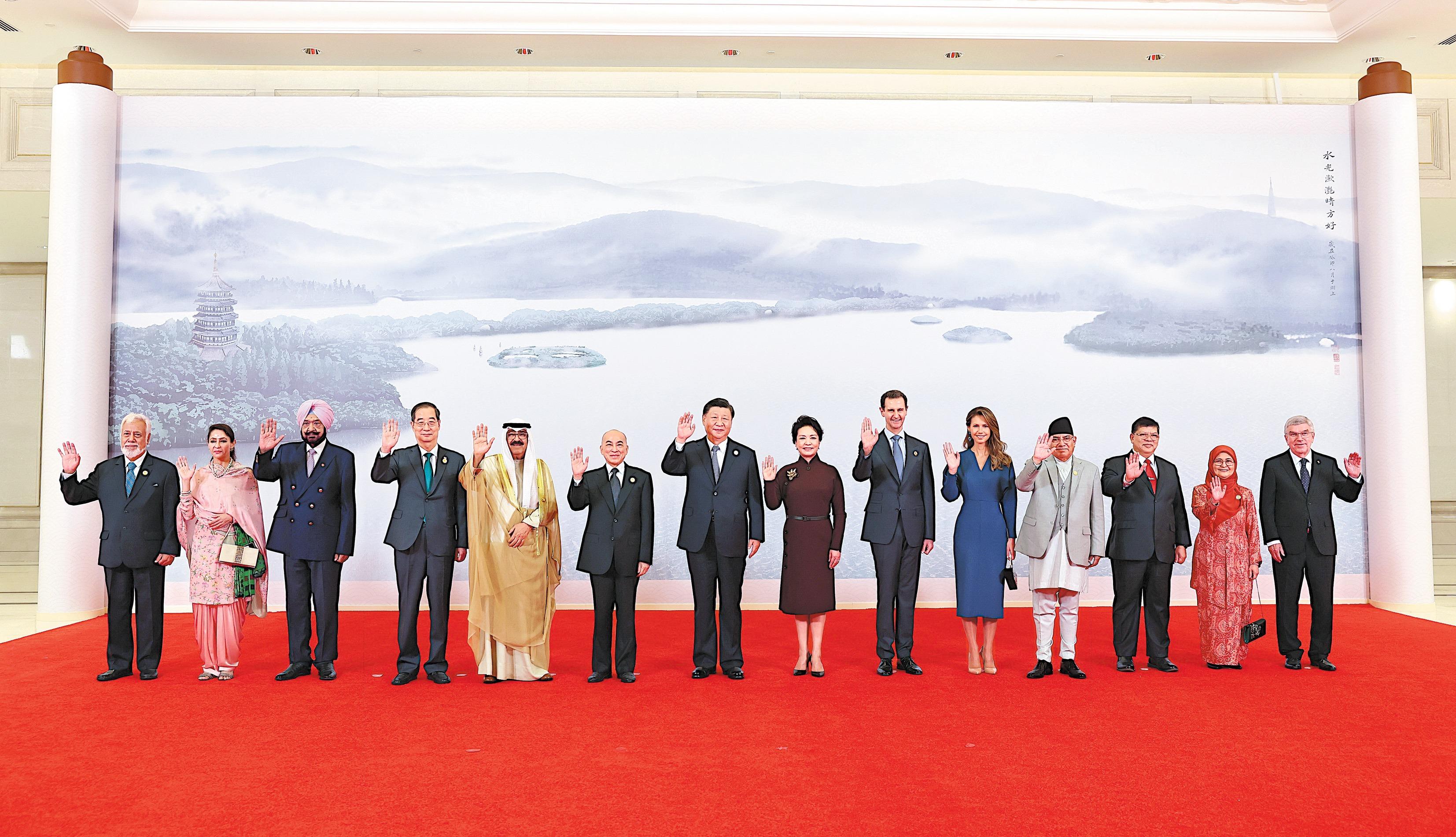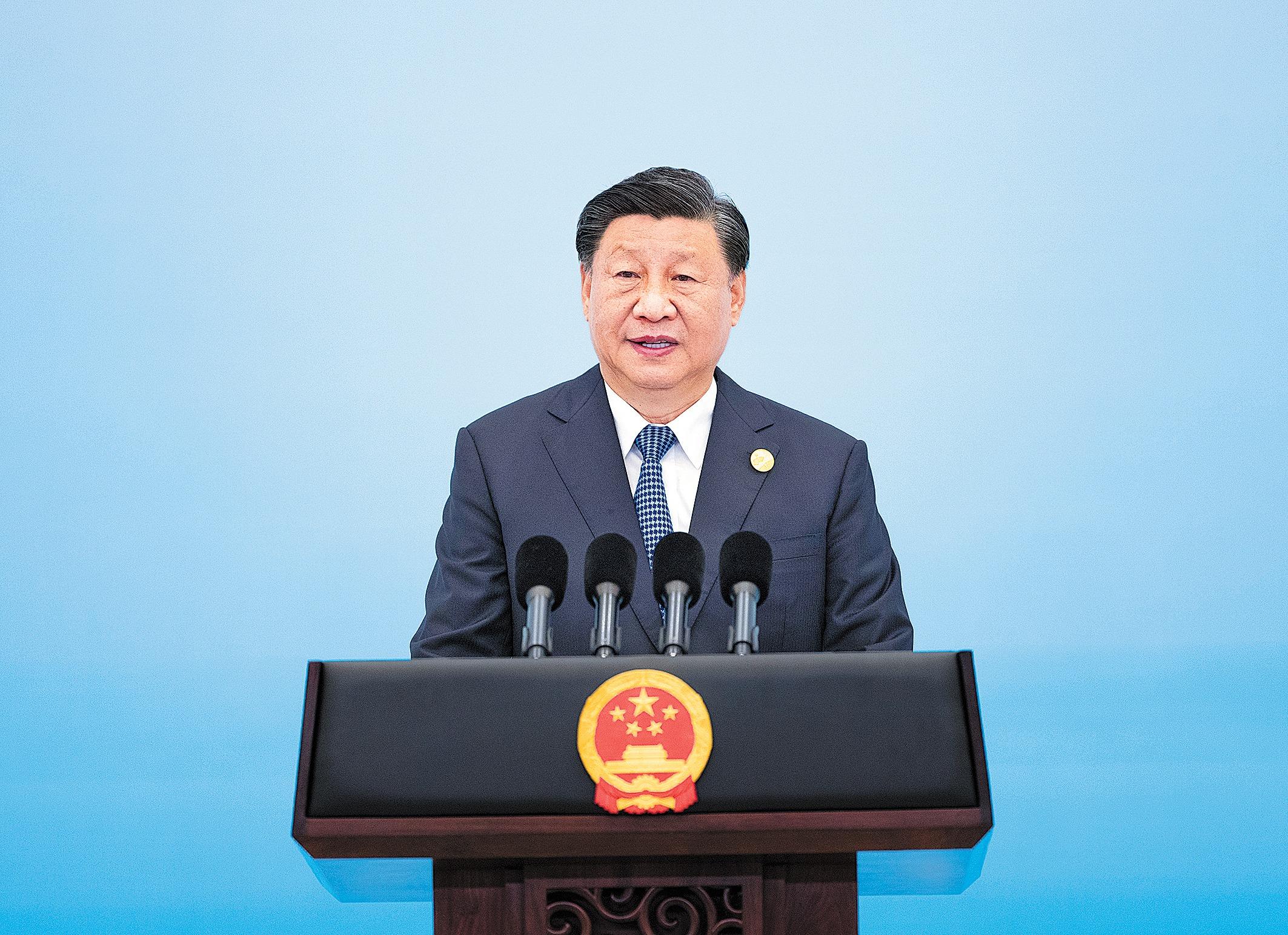Leaders welcome message from president about Asiad serving as bridge-builder; laud diplomacy
 President Xi Jinping and his wife Peng Liyuan pose for a photograph with guests at a welcome banquet ahead of the opening ceremony of the 19th Asian Games, in Hangzhou, Zhejiang province, on Sept 23. (FENG YONGBIN / CHINA DAILY)
President Xi Jinping and his wife Peng Liyuan pose for a photograph with guests at a welcome banquet ahead of the opening ceremony of the 19th Asian Games, in Hangzhou, Zhejiang province, on Sept 23. (FENG YONGBIN / CHINA DAILY)
President Xi Jinping called for collective efforts to make Asia “an anchor of world peace”, saying that sports should serve to pursue good neighborliness and mutual benefit, while also urging rejection of Cold War mentality and bloc confrontations.
Xi addressed a welcome banquet for the 19th Asian Games opening ceremony on Sept 23 in Hangzhou, Zhejiang province, highlighting the Asiad as the embodiment of “the Asian people’s shared desire for peace, unity and inclusiveness”.
“As humanity faces unprecedented global challenges, we should use sports to promote unity, seize the historic opportunity, and jointly stand up to the challenges,” he told banquet guests hours before the opening of the Games.
The gathering, hosted by Xi and his wife Peng Liyuan in a hotel by the city’s iconic West Lake, brought together dignitaries from China and 10 other Asian countries, as well as acting president of the Olympic Council of Asia, Raja Randhir Singh, and International Olympic Committee President, Thomas Bach.
The Chinese president began by noting that the opening of the 19th Asian Games fell on the autumn equinox, a day of harvest and reunion known as Qiufen on the Chinese lunar calendar.
China has earnestly fulfilled its commitments and made every effort in its preparations since it was awarded the right to host the Games, Xi said.
“We look forward to working together closely with the Olympic Council of Asia and delegations from all countries and regions to deliver to the world a great event that is distinctly Chinese, uniquely Asian, and spectacular, and to make new contributions to the Olympic Movement in Asia and the world,” he said.
He pointed out that, in recent decades, the continent has enjoyed general stability and has sustained rapid economic growth to create the “Asian miracle”, which is without comparison in the world.
“The Asian Games have not only been a witness to this achievement but also a participant and a contributor,” he said.
This year’s Asiad has set a record in the number of registered athletes and events. This reflects the Asian people’s great expectations and firm support for the Hangzhou Games, Xi said.
Nearly 12,500 athletes from 45 countries and territories are competing in 40 sports, according to the organizing committee.
“We should use sports to promote unity,” Xi said. He called for efforts to “open up broader prospects for the Asian road toward common development, openness, and integration”.
The Hangzhou Games include many disciplines with distinctive Asian features, such as wushu, sepak takraw, and Chinese chess.
“It provides a platform to celebrate sports and ... showcase Asian culture that is inclusive, vibrant, and always keen to learn from others,” Xi said.
“We should use sports to promote inclusiveness, enhance confidence in our civilizations, pursue exchanges and mutual learning, and renew the glory of Asian civilizations.”
The Chinese president also gave the dignitaries a brief introduction to Hangzhou, a city known for its natural beauty and rich culture. He quoted Italian explorer Marco Polo, who described Hangzhou as “the City of Heaven, the finest and the noblest in the world”.
Before the banquet, guests were treated to a display of local intangible cultural heritage.
During his speech, Xi also mentioned his experience working in Zhejiang between 2002 and 2007, during which he first put forward the concept, “Lucid waters and lush mountains are invaluable assets”. This has since become a guiding principle of China’s environmental and ecological protection and restoration.
 President Xi Jinping addresses the welcome banquet ahead of the opening ceremony of the 19th Asian Games. (PHOTO / XINHUA)
President Xi Jinping addresses the welcome banquet ahead of the opening ceremony of the 19th Asian Games. (PHOTO / XINHUA)
Zhejiang is strongly committed to reform and opening-up, and is fast-tracking toward high-quality development, he said, adding that the province is building a demonstration zone for common prosperity and has become a pioneer of Chinese modernization.
Xi concluded his speech by wishing all the international guests an unforgettable experience in picturesque Zhejiang and fond memories of the Asian Games.
China’s tangible commitment to world peace, unity, and prosperity was noted by global leaders as they endorsed Beijing’s latest diplomatic efforts led by President Xi during the Asiad.
The 19th Asian Games are the largest and highest-level comprehensive international sports event organized by China since the conclusion of the 20th National Congress of the Communist Party of China in 2022.
Scholars said that China’s hosting of the Asian Games aims to use sports “to advance peace, shore up unity and bolster inclusiveness”, and that the latest sports diplomacy led by Xi has been a success.
Xiao Jianzhong, a professor at Zhejiang University of Technology’s School of Marxism, said, “For China, the Hangzhou Asian Games not only are a major sporting event but also serve as an important event for diplomacy rolled out at home, as well as an important stage for exchange among various civilizations in Asia.”
From Sept 22 to 23, Xi engaged in bilateral meetings in Hangzhou with the visiting Asian leaders of six nations and the heads of the Olympic Council of Asia and the International Olympic Committee.
The meetings with the prominent figures took place at a State guesthouse at West Lake, a scenic tourist destination in Hangzhou.
As this year marks the 10th anniversary of Xi’s proposing the concept of China seeking “amity, sincerity, mutual benefit, and inclusiveness” with its neighbors, the president referred on Sept 23 to this principle during his talks with foreign leaders.
Speaking with Cambodian King Norodom Sihamoni, Xi said that China-Cambodia relations epitomize this principle, and he noted China’s commitment to good-neighborliness and partnership with its neighbors in its diplomacy in the region.
The king hailed the two-way ironclad, brotherly relations, saying that his country stands ready to work with China on Belt and Road cooperation and build a Cambodia-China community with a shared future.
IOC President Thomas Bach told Xi on Sept 22, “I believe there will be successful and wonderful Asian Games that will promote the unity and friendship of Asia.”
He said the IOC is committed to safeguarding the non-politicization of sport, which is broadly supported by the world community, and it endorses China’s correct position on this.
Crown Prince of Kuwait Sheikh Mishal Al-Ahmad Al-Jaber Al-Sabah said President Xi’s proposals to build on the Belt and Road Initiative, Global Development Initiative, Global Security Initiative, and Global Civilization Initiative are “based on the noble goals and tenets of promoting the peace and progress of mankind”, which Kuwait firmly supports and actively participates in.
Observers noted that Beijing’s consistent pursuit of world prosperity and peace was also reflected in two joint statements released following Xi’s talks with Syrian President Bashar al-Assad and with Timor-Leste’s Prime Minister Xanana Gusmao on Sept 22 and Sept 23, respectively.
In the two statements, China announced the establishment of a strategic partnership with Syria and a comprehensive strategic partnership with Timor-Leste.
Co-building the Belt and Road as well as a community with a shared future for mankind, bolstering local livelihoods, and “jointly advancing genuine multilateralism” in the international arena are among common points of consensus in the statements.
Ma Xiaolin, a professor and director of Zhejiang International Studies University’s Institute for Studies on the Mediterranean Rim, said China, as a top developing country and the world’s second-largest economy, “has never forgotten its social responsibility as a major country in Asia and the world”.
The Hangzhou Asian Games are the city’s “biggest stage to showcase China’s image to the outside world and to promote face-to-face exchanges among people from all countries” since Hangzhou hosted the G20 Summit seven years ago, he said.
Yasir Habib Khan, a writer for The Nation, a Pakistani newspaper, said that cricket’s return to the Asian Games and its inclusion in the Hangzhou events “is a pivotal moment for the sport and for China’s diplomatic endeavors”, as teams of both Pakistan and India now may have the chance to embark on friendly rivalry at the games.
The inclusion of the sport in the Asian Games “showcases China’s commitment to using sports as a bridge for international engagement and cooperation”, he wrote.
The Asian Games in Hangzhou serve as a “testament to the power of sports to unite nations, break down barriers, and craft a shared narrative of friendship and cooperation on the global stage”, he added.
Contact the writers at xuwei@chinadaily.com.cn


